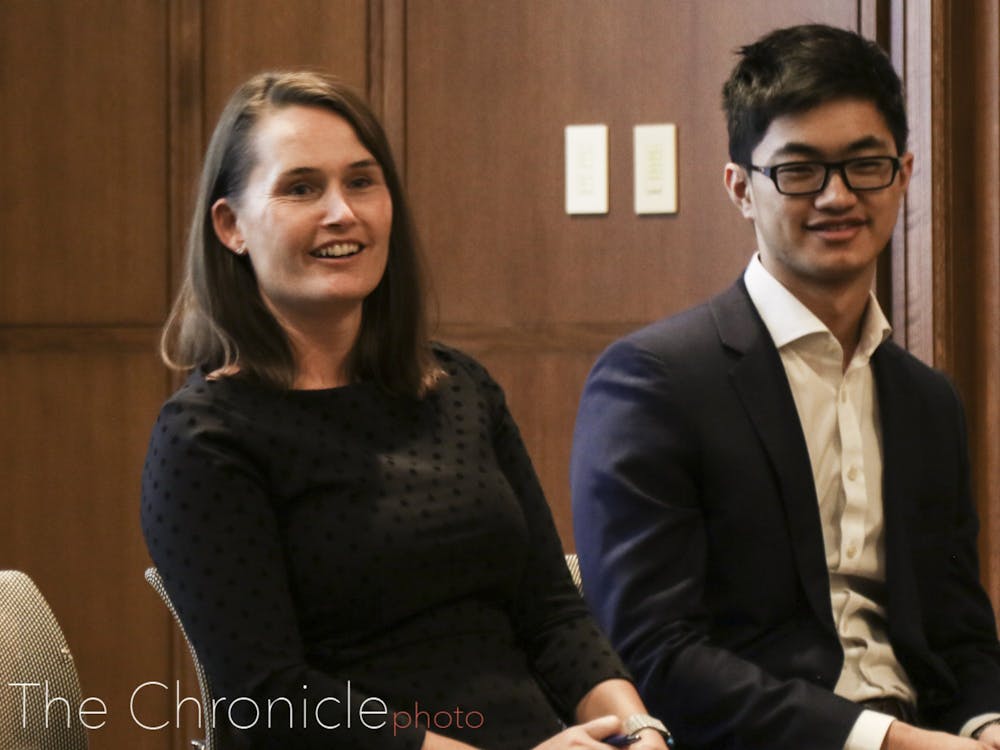Duke administration and people representing the Board of Trustees discussed a number of topics at the Board's Wednesday open forum, from changes in the undergraduate experience to the hiring of new faculty and Duke’s relationship with the Durham community.
Undergraduate experience shakeup
Ian MacMullen, assistant vice provost for undergraduate education, summarized the recent proceedings of the Next Generation Living and Learning Experience Task Force, the group examining aspects of undergraduate life at Duke.
“There is a general consensus among the task force, and more broadly, I think, that the West Campus experience lags a little bit behind the East Campus experience,” MacMullen said, describing the committee’s specific focus on West Campus.
A program to remedy this by targeting sophomore students is currently in the works. MacMullen said that the group is aware of a “sophomore slump” among Duke students—when second-year students traditionally experience a dip in performance from their first year. MacMullen emphasized that this is an issue at other universities as well, but the task force is working to address it.
Hallie Davis-Penders, senior program coordinator for the office of undergraduate education, highlighted difficulties with housing selectivity and the difficulty of upper-level courses as possible causes. Another potential stressor is the relative decrease in resources available for helping upperclass students in comparison to first-years, she said.
Davis-Penders also discussed the lack of a sense of community and belonging that sophomore students may face, given the more cohesive nature of the East Campus housing system.
MacMullen described some potential solutions the task force is exploring, including a program to link East and West Campus communities to help create cohesive neighborhoods of upper-class students. The details of this program, however, have not yet been fleshed out.
The group is also considering a program to increase faculty engagement in the West Campus housing experience. This would be similar to the faculty-in-residence program on East Campus, but with faculty possibly taking on non-residential roles in neighborhoods on West.
Hiring new faculty
Speaking on behalf of the Advancing Duke Science and Technology Task Force, Provost Sally Kornbluth discussed how the group has been working with trustees and faculty to identify the current strengths of the University and find opportunities to “become leaders in certain areas of science.”
She described a push to hire exceptional new faculty in areas such as material science and data science, specifically in the intersection of artificial science and health.
“We’re really focusing on luminaries who will really just up our overall game in the sciences and technology,” Kornbluth said.
To assist in this, new interdisciplinary hiring committees have been formed, jumpstarted by a $50 million grant from the Duke Endowment. Deans and department chairs on the committees can nominate individuals they are considering hiring, and the committees have already begun the hiring process.
An audience member asked Kornbluth what this means for the fate of early-career academics who are not yet established in their respective fields. Kornbluth said the new hiring scheme is meant to supplement regular department hiring by bringing in individuals who stand out from the pack, citing Vice President for Research Lawrence Carin in describing this sort of individual as a “singularity,” or a leader in a field.
Relationship with the community and beyond
A recurring theme throughout the panel was an interest in continuing to grow Duke’s relationship with the Durham, the city and county.
At their last meeting, the trustees met with community officials representing both the city and county.
“We spent a little time with city and county leaders, sort of mulling around in this issue with them, and what was I think was useful was that they heard what we were interested in, and they talked to us about some of their priorities as well, which weren’t always exactly down center-line with what the trustees were proposing,” said Richard Riddell, senior vice president and secretary to the Board of Trustees.
Other key takeaways
Executive Vice President Tallman Trask is leading a committee tasked with planning the future of Central Campus. Riddell summarized the committee’s proceedings in Trask’s absence, noting that the demolition of Central Campus has progressed as expected. The committee is searching for interesting ideas for what to do with the expanse of land sitting between East and West Campuses.
Riddell said the land might be used as a site for future advances in research and commercial investment and highlighted the possibility of working with community partners to put the land to good use.
Stelfanie Williams, vice president of Durham affairs, discussed Duke’s approaching deadline to achieve carbon neutrality and emphasized that the Board is aware of this goal in their decision-making.
Her discussion of neutrality came in response to a question posed by Jason Elliot, assistant director of Sustainable Duke, who raised the issue of sustainable transportation. Williams explained that, although the Board did not explicitly discuss this, the University is working closely with Durham.
Margaret Epps, special assistant to the president, noted that with six members of the Board of Trustees set to retire in 2021, the Governance Committee has begun to explore the future identity of the Board.
Get The Chronicle straight to your inbox
Signup for our weekly newsletter. Cancel at any time.

